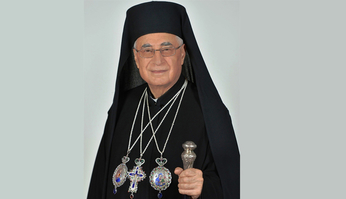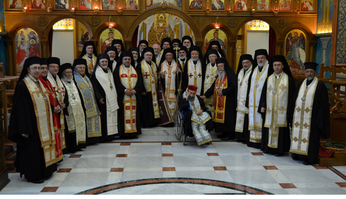Patriarch Youssef
Thanks to the Iraqi Refugees - Mgr Samir Nassar
Syrian Archbishop: Iraqi Refugees Renewed Our Church
Letter of Maronite Archbishop Nassar of Damascus
DAMASCUS, Syria, MARCH 14, 2011 (Zenit.org).- Here is a translation of the letter written by Maronite Archbishop Samir Nassar of Damascus, titled "Thanks to the Iraqi Refugees."
Syria has facilitated the reception of Iraqi refugees. Thousands of them have come, above all to Damascus, and hundreds of them continue to come to flee from death and the violence they have suffered since 2003. U.N. agencies organize their exodus to other more clement skies. While waiting for their visas, these refugees stay in Damascus, at times for two or three years and sometimes more.
These well-formed Christians, fervent and practicing, take refuge in Christian faith and hope. They fill our churches, invigorate our parishes and reinforce the Christian faith in Syria, offering new encouragement to our parishes.
Iraqi refugees take part assiduously in daily Mass despite the fact they come from far away, on foot or public transport.
On asking for confession before receiving Communion, these refugees have accelerated the return to the confessional which now has waiting queues.
Their devotion to the saints and veneration of the Virgin has relaunched the production of candles and the niches of the saints both within and outside the churches are illuminated day and night.
Their children are numerous in the catechism and first Communion classes. Young people are involved in the choirs and liturgies of different churches.
The war spread information technology rapidly in Iraq. These refugees who have arrived in Damascus are very familiar with the Internet and the Web. They have put their knowledge in a generous way at the service of parishes and communities. In this way, thanks to them, our parishes have been equipped with Web sites, vanguard instrument at the service of evangelization at a universal scale.
Moved by profound piety, they come together in dozens, two or three times a week, to do the great cleaning of the cathedral and the Square of the Church until they receive their visas. Before traveling, they ensure the take over in this activity.
They take part in prayer vigils, eucharistic adoration, pilgrimages and processions on the streets of Damascus during Holy Week and especially in the month of May. Their spiritual dynamism attracts other communities, one of our priests gives a helping hand in the Chaldean parish.
Despite their poverty and precarious condition of life, they are generous and know how to share. Suffice it to see them as they leave Mass giving help with joy, a smile and tears.
They live their more intimate moments in silence before the Most Blessed Sacrament, face-to-face with the Lord. For hours, they mourn the death of their loved ones and wonder about the future. And they try to understand the reason why.
They arrive in great numbers at the archbishopric every week to say good-bye before traveling to the unknown, and at times separated: parents to Australia, children to Canada. Even in exile they cannot live as a family, an even more painful wrench.
These Iraqi refugees passing though Damascus are itinerant missionaries who have left their imprint on the Church in Syria, which sees them pass by and wonders about its own future.
The synod of Christians of the East was an opportunity and a hope which, however, has been unable to halt the exodus. These missionary refugees scattered in the four corners of the world are united only by prayer and the Internet, as their roots have been torn and they live the twilight of their Church. Will these Iraqi refugees, with their religious vitality, offer a new encouragement to the Churches of the East that receive them?
[Translation by ZENIT]

